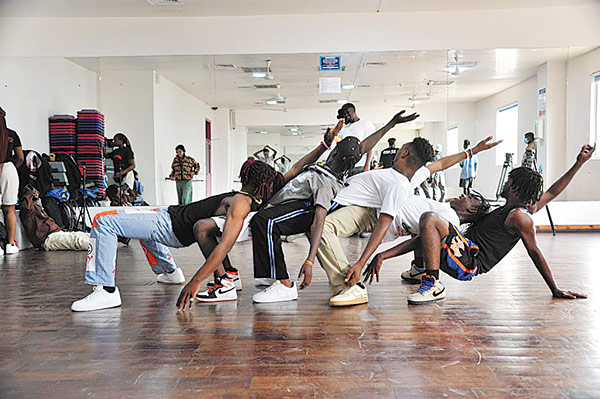

When three friends in Ghana settled on dancing as a career, their aim was not just to dance onstage and make an income but to improve the dance culture by making it more attractive and competitive.
Lloyd Annor Konadu, Ernest Kwablah and Nicholas Botchwey started Dance With a Purpose Academy in 2017.
The dance school is located at the Lizzy Sports Complex in East Legon, a plush residential area in the Ghanaian capital, Accra. It dedicates three sessions each week to coaching talented dancers of different ages and with diverse backgrounds in various moves of African beats and rhythms.
"We decided to share with young people, who, after watching our videos so many times online, developed a love for dancing and wanted to take it up as a career," says Konadu.
Other than the School of Performing Arts at the University of Ghana, the dance school emerged as a pioneer in seeking to deepen African dance culture by grooming young dancers to adopt a professional approach.
"Our main agenda is to change the perception about the dancing profession and guide those interested in dancing to make careers out of it," adds Konadu.
The school is not only about dancing but also an opportunity for young people to be inspired to develop their career paths and life goals.
"I believe when we give these young people the platform and guide them, they can find their purpose. Some of them can rap, some can act, but they haven't realized it, so we guide them to discover their potential," he says.
Five years after setting up the school, the efforts of the three co-founders are beginning to yield dividends-they have trained more than 200 dancers so far, some of whom excel onstage.
"Most of these 200 students are not just dancing. The school is about dancing with a purpose. When you come here, we teach you about dancing and teach you to focus on your life's goals as well," says Botchwey.
Some of the dancers now do brand placement, endorsement, acting and other gigs for income.
"The dance culture needs to be preserved because it also serves as a major source of income for Ghana's tourism revenue," says Botchwey.
"Sometimes when visitors to Ghana want to learn about our culture, we go to showcase Afro-pop to them as part of the package."
Agyapong Derrek Asare, a nurse in Ghana's health sector, found a second career as a dancer through the efforts of the school.
He combined his nursing training in Ho, the regional capital of the country's Volta area, with dancing rehearsals while in school. Today, Asare works both as a nurse and a stage dancer.
"I left school and started working at the Tema General Hospital. But I have paused the nursing job a little to focus on dancing. I will go back into nursing after pushing my dancing career a bit further because there is a lot I can do with dancing," Asare says.
"I have been in many music videos and made some good money. I performed onstage during the African festival, Afrochella, here in Ghana, and during the Ghana Music Awards. But I have not done any international show yet," he adds.
Richel Achempim is an accounting student at the University of Ghana and a member of the school. In addition to performing on the Afrochella stage, Achempim has also appeared in several music videos with other artists.
"I want to become one of the best female dancers in the world," she says, adding that the number of female dancers is smaller than male in Ghana.
"So if I put in my all, with more energy and get to the top, the younger ones coming up would look up to me for inspiration."
Kwablah, one of the school's founders, says social media has helped their work.
"Now, you can be anywhere in the world and see something on social media and appreciate it. Social media and hard work are what has got us here," he says.
Kwablah says the team is not complacent as there are bigger dreams for the future.
"We are a success already because we have changed lives and have taken people off the streets. The future is about having our infrastructure, as a school where people can come from different countries to stay and learn from us," he says.
"We do not want the situation where after this crop of dancers grows old, the next generation of dancers would not have people to look up to. Our school will ensure that what we have started lives on. So, we want to preserve the dance culture over several generations."